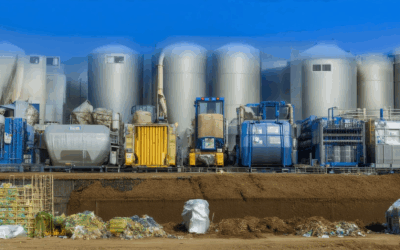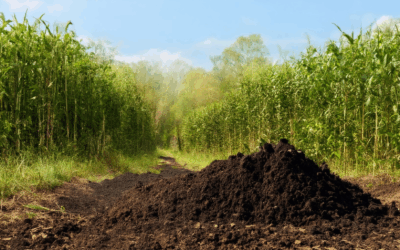As the world continues to seek innovative solutions to combat climate change and promote sustainable practices, biochar has emerged as a promising natural substance with far-reaching environmental benefits. Derived from organic materials through a controlled pyrolysis process, biochar is not just another agricultural additive—it’s a versatile compound that plays a crucial role in enhancing soil health, reducing chemical dependencies, and contributing to carbon sequestration efforts. With its ability to improve soil fertility, reduce greenhouse gas emissions, and promote biodiversity, biochar stands out as a valuable tool in our quest for a more sustainable planet.

Is Biochar Environmentally Friendly?
Biochar is considered environmentally friendly due to its production process and benefits:
- Sustainable Production: Produced through pyrolysis, biochar generates its own heat, reducing reliance on external energy sources.
- Waste Management: Made from organic waste, it helps reduce landfill use and manages waste effectively.
- Carbon Sequestration: Acts as a stable carbon sink, storing carbon and aiding in carbon capture efforts.
- Soil Improvement: Enhances soil fertility and structure, promoting plant health and reducing the need for chemical fertilizers.
However, it’s crucial to note that biochar production emits greenhouse gases, though these can be managed with controlled systems. Its effectiveness also depends on efficient production processes.
Downsides of Biochar
Biochar, while widely recognized for its benefits, does have certain drawbacks and considerations:
- Environmental Contamination Risk: Biochar can contain harmful substances such as heavy metals (lead, mercury, arsenic) and persistent organic pollutants (POPs). These contaminants may leach into nearby soil, water, and air, posing risks to ecosystems and human health.
- Greenhouse Gas Emissions: Production of biochar can emit greenhouse gases, particularly if the feedstock isn’t sourced sustainably. Improper management of organic waste during pyrolysis may lead to increased methane and carbon monoxide emissions.
- Soil Health Disruption: In excess, biochar can block soil pores, reducing water infiltration and hindering root growth. It may also alter microbial activity, potentially disrupting the delicate balance of soil organisms.
- Carbon Sequestration Trade-offs: As a carbon sink, biochar helps sequester carbon, but it can slow the decomposition of organic matter in soil, reducing the soil’s capacity to release CO2. This creates a balance between carbon storage and nutrient cycling.
- Regulatory and Variability Issues: Biochar standards vary globally, leading to inconsistencies in product quality and efficacy. Farmers and users may face challenges in sourcing reliable, high-quality biochar that meets local regulations.
These factors highlight the importance of careful selection, application, and monitoring when using biochar to ensure it supports sustainable practices without unintended consequences.

How Does Biochar Help Combat Climate Change?
Biochar plays a vital role in addressing climate change by actively working to reduce greenhouse gas emissions and enhance carbon storage. Here’s a breakdown of its contributions:
Carbon Sequestration
Biochar acts as a powerful tool for carbon sequestration. When applied to soil, it captures and stores carbon dioxide (CO2) from the atmosphere. This process effectively removes carbon from the active cycle, preventing it from contributing to global warming. Over time, biochar enhances soil fertility and structure, creating a long-term carbon sink.
Improving Soil Health
Biochar significantly improves soil health by adding essential nutrients like phosphorus and potassium. Healthier soils are better equipped to absorb and store carbon, further amplifying its climate-beneficial properties. Enhanced soil also boosts agricultural productivity, supporting sustainable farming practices.
Reducing Methane Emissions
Biochar can help reduce methane emissions, another major greenhouse gas. When used in composting processes, particularly with livestock waste, it mitigates methane production. This dual benefit of absorbing CO2 and reducing methane makes biochar a versatile solution for combating climate change.
Supporting Carbon Farming Initiatives
Biochar is integral to carbon farming, an emerging practice that focuses on sequestering carbon in agricultural systems. Farmers can incorporate biochar into their operations to improve yields, reduce inputs, and contribute to global carbon goals. This approach aligns with broader efforts to promote sustainable land management.
- Carbon Negative Potential: Biochar production can result in a negative carbon footprint, offsetting emissions from other activities.
- Sustainable Land Management: By enhancing soil, biochar supports resilient ecosystems that can adapt to climate changes.
- Economic Benefits: Biochar production creates jobs and offers a sustainable alternative to traditional energy sources.
Pyrolysium.org provides detailed insights into biochar production and its applications, offering practical guidance for those interested in adopting sustainable practices. Explore their resources to learn more about how biochar can be integrated into your climate action strategies.

Economic Benefits of Biochar
Biochar offers significant economic advantages that extend beyond its environmental benefits. Here’s a breakdown of the key economic benefits:
- Cost-Effectiveness: Biochar serves as a cost-effective alternative to synthetic fertilizers, reducing reliance on expensive chemical inputs while enhancing soil health.
- Carbon Sequestration Incentives: Governments may offer subsidies or tax credits to farmers using biochar due to its role in carbon sequestration, providing an additional economic benefit.
- Dual-Purpose Energy Production: Efficient biochar production processes can generate energy (e.g., syngas or electricity), adding value and making the production process more economically viable.
- Agricultural Productivity Boost: Improved soil health from biochar leads to higher crop yields, increasing farmer incomes and supporting rural economies.
- Scalability and Market Potential: The production process can scale, and growing demand for biochar as a soil amendment creates opportunities for businesses and investors in the biochar industry.
- Environmental Protection: Biochar’s ability to clean soils reduces contamination risks, safeguarding ecosystems and public health, which indirectly contributes to economic well-being.
- Job Creation: Biochar production supports job creation in processing, manufacturing, and distribution, stimulating local industries and regional economies.
- Competitive Advantage: Early adoption positions regions ahead in sustainable agriculture, fostering international trade and partnerships driven by green technology initiatives.
By integrating biochar into farming practices, nations can leverage these economic benefits while contributing to sustainable development goals. This approach not only enhances agricultural productivity but also supports eco-friendly industrial growth, positioning regions as leaders in sustainable resource management.
Why is biochar not widely used?
Biochar, a carbon-rich material produced through pyrolysis of organic waste, has significant potential as a sustainable agricultural amendment. However, its limited adoption can be attributed to several factors:
- Production Challenges : The process of creating biochar requires specific conditions, such as high temperatures and controlled environments, which can make it costly and energy-intensive. Additionally, the availability of suitable feedstocks is essential for consistent production, and this can vary depending on regional resources.
- Nutrient Sorption Issues : One of the primary concerns with biochar is its ability to adsorb nutrients, which can interfere with the effectiveness of conventional fertilizers. This characteristic may deter farmers who are accustomed to using chemical fertilizers and fear a reduction in crop yields.
- Public Awareness and Education : Biochar’s benefits are not widely understood, limiting its adoption. Many farmers and agricultural professionals are unaware of its potential to enhance soil health and crop resilience, which hinders its integration into farming practices.
- Regulatory Hurdles : Biochar may face regulatory challenges due to variability in product quality and concerns about contamination, such as heavy metals. These issues can create barriers for widespread acceptance and adoption.
- Market Competition : Established agricultural products, such as chemical fertilizers, dominate the market and offer familiar and reliable solutions. Biochar’s niche appeal may not yet outweigh the established competition.
- Cost Considerations : High production costs and uncertain market pricing can limit biochar’s accessibility. Unless it achieves a competitive edge in price and performance, it may struggle to gain broader acceptance.
- Adoption Barriers : Farmers often resist changes in practices that disrupt their existing systems. Biochar’s unique properties and required application methods may necessitate shifts in farming routines, which can be met with resistance.
These factors collectively contribute to the low adoption rate of biochar, despite its promising benefits for sustainable agriculture. As awareness grows and production efficiencies improve, biochar may become a more mainstream solution in the future.

How Does Biochar Affect the Environment?
Biochar plays a significant role in enhancing environmental health and sustainability. As a versatile material derived from organic waste through pyrolysis, biochar acts as a natural solution for various environmental challenges.
Reducing Greenhouse Gas Emissions
Biochar helps mitigate climate change by reducing non-CO2 greenhouse gas emissions from the soil by 12–50%. This makes it an effective tool in combating global warming and promoting carbon sequestration.
Improving Soil Health
One of the most notable benefits of biochar is its ability to enhance soil fertility. By increasing soil organic carbon by up to 3.8%, biochar improves soil structure, water retention, and nutrient availability, leading to healthier plant growth and stronger agricultural systems.
Supporting Biodiversity
Biochar serves as a habitat for microorganisms, earthworms, and other organisms, contributing to increased biodiversity. Its porous structure provides shelter and food sources, fostering a thriving ecosystem in the soil.
Promoting Sustainable Agriculture
By boosting crop yields by 10–42%, biochar reduces the need for synthetic fertilizers and pesticides. This not only enhances farm productivity but also minimizes environmental harm associated with chemical inputs.
Recycling Waste
Biochar offers a sustainable solution to waste management. Converting organic waste into biochar diverts it from landfills, reducing methane emissions and promoting a circular economy.
Visit our biochar benefits page to learn more about its environmental impacts and applications.
Conclusion
Biochar is a powerful tool for environmental stewardship, offering benefits ranging from reducing greenhouse gases to supporting biodiversity. Its use fosters sustainable practices and contributes to a healthier planet for future generations.




0 Comments